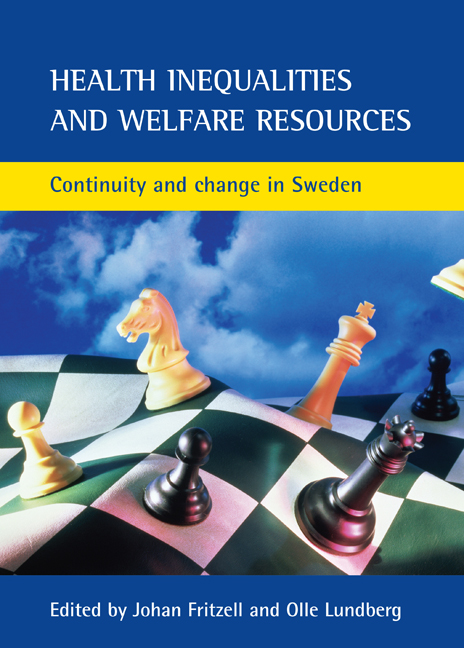Book contents
- Frontmatter
- Contents
- List of tables and figures
- Notes on contributors
- Acknowledgements
- Foreword
- one Health, inequalities, welfare and resources
- two Health and inequalities in Sweden: long and short-term perspectives
- three Changing gender differences in musculoskeletal pain and psychological distress
- four Life course inequalities: generations and social class
- five Work stress and health: is the association moderated by sense of coherence?
- six Psychosocial work environment and stress-related health complaints: an analysis of children’s and adolescents’ situation in school
- seven Assessing the contribution of relative deprivation to income differences in health
- eight Social capital and health in the Swedish welfare state
- nine ‘What’s marital status got to do with it?’: gender inequalities in economic resources, health and functional abilities among older adults
- ten Health inequalities and welfare resources: findings and forecasts
- References
- Index
- Also available from The Policy Press
nine - ‘What’s marital status got to do with it?’: gender inequalities in economic resources, health and functional abilities among older adults
Published online by Cambridge University Press: 14 January 2022
- Frontmatter
- Contents
- List of tables and figures
- Notes on contributors
- Acknowledgements
- Foreword
- one Health, inequalities, welfare and resources
- two Health and inequalities in Sweden: long and short-term perspectives
- three Changing gender differences in musculoskeletal pain and psychological distress
- four Life course inequalities: generations and social class
- five Work stress and health: is the association moderated by sense of coherence?
- six Psychosocial work environment and stress-related health complaints: an analysis of children’s and adolescents’ situation in school
- seven Assessing the contribution of relative deprivation to income differences in health
- eight Social capital and health in the Swedish welfare state
- nine ‘What’s marital status got to do with it?’: gender inequalities in economic resources, health and functional abilities among older adults
- ten Health inequalities and welfare resources: findings and forecasts
- References
- Index
- Also available from The Policy Press
Summary
Introduction
Beside the physiological ageing process, ageing is associated with significant economic and social change. The impact of these changes varies between different groups, cohorts and generations. The group of older adults aged 65 and over (old age pensioners) comprises an age span of over 30 years, and covers substantial diversity and inequality. Within this diverse group, basic dimensions of stratification such as gender, socioeconomic status and ethnicity are still present. The effect of these different dimensions on inequality of living conditions varies over the life course. They also interact more or less at different stages of life. Recently, marital status has also been shown to be an important dimension of inequality, especially among older adults (Arber, 2004).
In this chapter we aim to investigate whether present marital relationship and variation in lifetime resources contribute to economic and health inequalities between older men and older women. We will study how economic resources, health problems and the functional consequences of health problems vary between men and women according to marital status. Further, we also analyse the extent to which differences in economic resources contribute to gender and marital status differences in health and functional ability.
A number of studies have found that gender differences in various morbidity outcomes persist into later life (Thorslund and Lundberg, 1994; Arber and Cooper, 1999; Lahelma et al, 1999). Older women report more ill health and disabilities than coetaneous men, but the results are ambiguous and tend to vary according to health outcome. Older women are also more likely than older men to have limited economic resources (Arber and Ginn, 1991).
Socioeconomic inequalities in morbidity persist into the oldest ages, both in absolute and relative terms, in many, but not all, European countries (Huisman et al, 2003), including the Nordic ones (Lundberg and Thorslund, 1996b; Dahl and Birkelund, 1997; Avlund et al, 2003). In general, retired non-manual workers and those with a high income had a better health status than retired manual workers and those with a low income. This means that although older women have some social advantages (for instance, more social relationships with friends and family) over older men, they still face disadvantages in terms of economic and health resources.
- Type
- Chapter
- Information
- Health Inequalities and Welfare ResourcesContinuity and Change in Sweden, pp. 179 - 198Publisher: Bristol University PressPrint publication year: 2006
- 1
- Cited by

